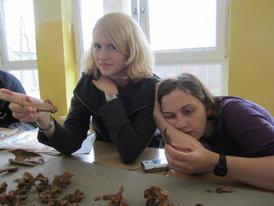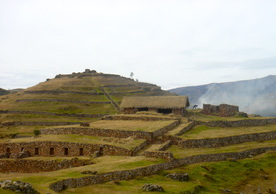Meghan made an interesting observation that stuck with me: "In retrospect, we weren't told WHY we needed a field school."
If you stumbled upon this post because you're an undergrad looking into field schools, I hope you'll go into things a little better informed than I was. Field school can be very expensive, so if you're going to do it, it's good to consider why it's important for your future career and professional development.
Like in many fields, aspiring archaeologists often encounter the classic dilemma of people new to the job market: how do you get get a job and build your experience, when even entry level jobs require that you already have experience? Field school is your opportunity to add some of that coveted experience to your resume. Whether you're applying for a field tech position, an internship, or grad school, having gone to a field school gives your resume a boost.
2. Field school is a great chance to network.
Not only will you bond with fellow students, but you'll also get to know professors and researchers. This network will be a valuable resource for the rest of your career. Archaeology is a very small world, and you never know when the people you meet along the way will end up playing a major role in your career! Plus, professional development aside, you will meet interesting people and make awesome new friends.
Many archaeologists are pretty specialized, and an important part of the early years of your career is figuring out what you want to specialize in. With an entire world to explore and all of human history to investigate, it can be tough to narrow your interests down to a specific time and place. Field school is a great opportunity to start this process. Think you want to work in Europe? Find a field school there! You can always change your mind later, but field school will give you a chance to "try on" different specialities.
4. Field school is a starting point on which to build your expertise.
Field school isn't universal and it certainly won't teach you everything. However, it should give you a basic skill set that you will be able to use in future field work and teach you how to think like an archaeologist. Archaeology skills won't transfer universally. If you do a marine archaeology field school in Florida, you might not walk away with the knowledge necessary to excavate a pre ceramic site in the New Mexico desert. However, your field school should instill in you enough judgement and understanding of the archaeological process that you will be able to hit the ground running.
5. Field school gives you experience outside the classroom.
If you're an undergrad, chances are most of your archaeology experience is in the classroom. Your classroom education is very important, but the reality of things is that archaeology is a field science, and sometimes you just need to get the hell out of the classroom! All the theories and terminology you learn in school need to be put into practice, and field school is the place to do that.
6. Field school helps you decide how much you really like archaeology.
Now, of course, I have a hard time believing that not everybody is in love with archaeology. However, the reality is that it's simply not for everybody. Truthfully, you might hate it! It isn't always fun. It can be uncomfortable or even painful. You'll work long hours. Sometimes you'll spend all day digging or surveying and not find a damn thing. Sometimes it can even be boring. Archaeology in the classroom is one thing, and archaeology in the field is a whole other beast, so it's very important to experience both before you commit to graduate school or a career in archaeology. There will be times when you spend all day surveying in the freezing rain, you're covered in mud, you've got a bruise on your cheek from getting whacked by a branch, and you come in from the field to find out that your crew has already gone through all the hot shower water. However, you'll know you found the right path when, at the end of a day like that, you can still say you love archaeology.
After your field school, you may decide archaeology isn't for you- and thats totally ok! Field school can still be a valuable experience even if you decide aren't going to make a career out of it. The next two reasons continue in this vein...
7. Field school can lead to a more educated public.
Frankly, I think it'd be great if everyone went to field school. Not all those people have to become archaeologists, but if they walk away with an increased understanding of why our material culture and heritage matter and need to be protected then I'd count that as a huge win for our profession. A good field school has the power to transform the way you see the world, and that is something you will carry with you regardless of where life takes you.
8. Field school gives you a chance to travel.
I was lucky enough to do my field schools in Peru and Poland. For a 20 year old who had never left the country before, the experience was incredibly formative and something I look back on very fondly. If you have the option of going abroad, field school can be a great opportunity to broaden your horizons.
I debated whether or not to include this point because, truthfully, it's pretty darn cynical. However, the simple truth is that, these days, field school is the the status quo. The people you compete with for internships, entry level CRM jobs, and grad school admissions will probably have a field school under their belt- or two, or three! The reality is that, by and large, you need field school in your resume if you want to be competitive.
I hope that was helpful for those of you currently researching field schools. There are more field school posts in the pipeline (including reviews/experiences- PS, anyone want to write one?) so stay tuned!





